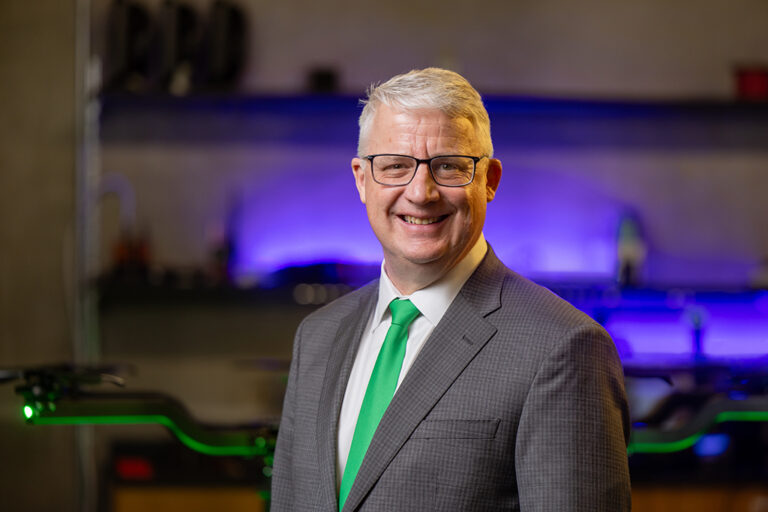High-tech training
UND Aerospace students get up-close-and-personal look at life in a working cockpit through virtual reality technology

UND Aviation students, faculty and staff members recently got a glimpse of just how high-tech their flight training can get without leaving the ground.
UND’ s John D. Odegard School of Aerospace Sciences (UND Aerospace), one of the biggest and best aviation schools in the world, hosted a team from Rockwell Collins that brought some of its virtual flight training gear for students to try out. Rockwell Collins and UND Aerospace have a long-standing relationship involving research ventures and funding support for students, but this was the first technology presentation of this scale and scope that the company has put on at the University, according to Nick Wilson, UND assistant professor of aviation.
One of the pieces Rockwell Collins demonstrated was its Virtual Avionics Procedures Trainer (VAPT), which the company donated to UND for research and student aviation training.
Rockwell Collins donated the VAPT to a support a collaborative team of UND researchers in the Departments of Aviation and Electrical Engineering for a patent-pending project to develop technology incorporating aspects of aircraft navigational and pilot psychological inputs, providing feedback to the pilot depending on certain metrics.
“The Rockwell Collins team brought together some key decision-makers who were able to see this donation to UND as beneficial to that effort,” Wilson said.
Rockwell Collins also decided UND Aerospace was a good recipient for its technology because it possesses a training fleet of King Air C90 aircraft, and the VAPT is currently configured with a common flight management system software to that particular aircraft.
“This donation can therefore be used both for training and for research purposes,” Wilson said.

UND students, faculty and staff tested out the VAPT technology at Ryan Hall while others took turns on other Rockwell Collins’ virtual reality equipment in the Unmanned Aircraft Systems lab in nearby Robin Hall. The Rockwell Collins team included Alex Postnikov, Paul Heyd, Jeannie Davison and Kirk Thorson. Heyd, Davison and Thorson, part of Rockwell Collins’ Simulation and Training Division, demonstrated the equipment.
Representatives of UND Aerospace (Aviation, UAS and Flight Operations and Maintenance) were joined at the presentation by UND staff and faculty members from Computer Science, Electrical Engineering, Mechanical Engineering and Psychology in a show of the multi-disciplinary and collaborative interests that exist in aviation research on campus.
“Aviation is a discipline which requires careful consideration of design, control and safety from a multitude of angles when considering how humans interact with machines,” Wilson said.
For instance, he continued, “the size, shape and location of controls and switches … have psychology or human factor considerations. As we (pilots) bring all of our pre-established experiences and associations, we have to communicate these needs and requirements for human-machine interface to the engineers to incorporate into designs.”
Then there’s the student-training aspects of Rockwell Collins’ virtual technology, which provides low-pressure, low-cost environments for aspiring pilots to learn their craft.
“Rather than training in a noisy cockpit while consuming precious time and fuel, the VAPT can bring the learning into a temperature-controlled environment where students can master basic skillsets prior to moving to the real-world training environment.”


